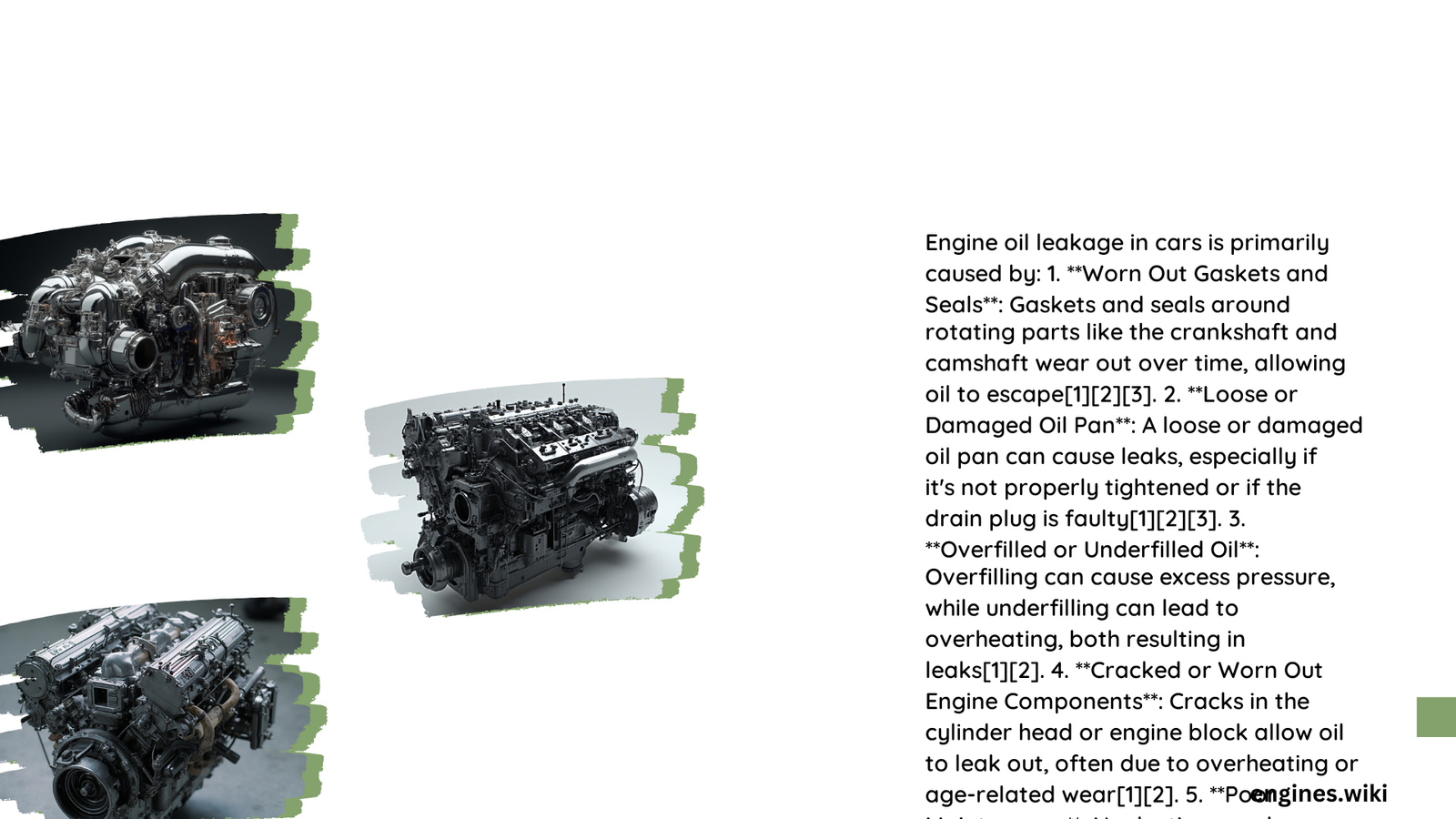Engine oil leakage in cars is a common issue that can lead to serious engine damage if left unaddressed. The primary reasons for engine oil leakage include worn or damaged oil seals, faulty gaskets, cracked oil pans, and deteriorated valve cover gaskets. These problems can result from normal wear and tear, improper maintenance, or external factors such as road debris impact. Understanding these causes is crucial for timely detection and prevention of oil leaks.
What Are the Main Causes of Engine Oil Leakage?
Engine oil leakage can occur due to various reasons, each with its own set of symptoms and potential consequences. Let’s explore the primary causes:
- Worn Oil Seals
- Damaged Gaskets
- Cracked Oil Pan
- Loose or Worn Oil Drain Plug
- Deteriorated Valve Cover Gasket
1. How Do Worn Oil Seals Contribute to Engine Oil Leakage?
Oil seals play a crucial role in preventing oil from escaping the engine. When these seals wear out or become damaged, oil leaks can occur. Here are some key points about oil seal failure:
- Causes of Oil Seal Failure:
- Material degradation due to heat and chemical exposure
- Improper installation
- Harsh operating conditions
- Inadequate lubrication
-
Mechanical stress
-
Types of Seals Prone to Failure:
- Single lip seals
-
Nitrile rubber seals
-
Average Lifespan:
- Standard conditions: 50,000 to 75,000 miles
- Harsh conditions: 5,000 to 10,000 miles
- Optimal conditions: Up to 125,000 miles
2. What Role Do Damaged Gaskets Play in Oil Leakage?
Gaskets are essential components that create a seal between engine parts. When they fail, oil leaks can occur. Here are the most common types of gasket leaks:
| Gasket Type | Susceptibility to Leaks | Failure Rate | Repair Cost Range |
|---|---|---|---|
| Head Gasket | High | High | $1,000 – $3,000 |
| Intake Manifold Gasket | Moderate | Moderate | $500 – $1,500 |
| Exhaust Manifold Gasket | Moderate | Moderate | $300 – $1,000 |
3. How Can a Cracked Oil Pan Lead to Engine Oil Leakage?
The oil pan is vulnerable to damage from external factors, which can result in oil leaks. Here are the specific conditions that can cause oil pan damage:
- Road debris impact
- Corrosion over time
- Engine overheating
Average Cost of Oil Pan Repair or Replacement:
– Minor repair: $200 – $500
– Full replacement: $500 – $1,500
Typical Time Required for Repairs:
– Repair: 2-4 hours
– Replacement: 4-8 hours or more
4. Why Does a Loose or Worn Oil Drain Plug Cause Oil Leakage?
The oil drain plug is a critical component in maintaining proper oil levels. Issues with this plug can lead to oil leaks:
- Improper tightening during oil changes
- Worn or stripped threads on the plug or oil pan
- Use of incorrect gasket or washer
Prevention Tips:
– Ensure proper torque when tightening the drain plug
– Replace the plug if threads are damaged
– Use the correct size and type of gasket or washer
5. How Does a Deteriorated Valve Cover Gasket Contribute to Oil Leaks?
The valve cover gasket seals the top of the engine, preventing oil from leaking out. Over time, this gasket can deteriorate:
- Causes of deterioration:
- Heat exposure
- Oil contamination
-
Normal wear and tear
-
Symptoms of a failing valve cover gasket:
- Oil spots on the engine or ground
- Burning oil smell
- Decreased engine performance
Repair Costs:
– Typically range from $100 to $350, depending on the vehicle make and model
What Are the Signs and Symptoms of Engine Oil Leakage?

Recognizing the signs of engine oil leakage is crucial for timely intervention. Here are the key indicators:
- Visible oil spots under the car
- Burning oil smell, especially when the engine is hot
- Low oil level on the dipstick
- Blue smoke from the exhaust
- Dashboard oil warning light
Measurable Indicators of Wear:
– Increased oil consumption
– Decreased engine performance
– Visible oil leaks around seals and gaskets
Average Mileage for Seal Wear:
– Seals typically begin to show signs of wear between 50,000 to 150,000 miles
How Can Engine Oil Leakage Be Prevented?
Preventing engine oil leakage involves regular maintenance and proactive measures:
- Regular Oil Changes: Follow manufacturer-recommended intervals
- Use High-Quality Oil: Choose oil that meets your vehicle’s specifications
- Inspect Seals and Gaskets: Check for wear during routine maintenance
- Address Minor Leaks Promptly: Don’t ignore small leaks as they can worsen
- Avoid Overfilling: Use the correct amount of oil during changes
Costs Associated with Replacing Worn Seals:
– Oil seal replacement: $50 to $500
– Engine overhaul (severe cases): $2,000 to $5,000 or more
By understanding the reasons for engine oil leakage in cars and taking preventive measures, you can extend the life of your engine and avoid costly repairs. Regular maintenance and prompt attention to any signs of leakage are key to keeping your car’s engine healthy and efficient.
